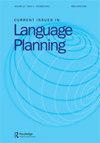Language planning and policies in Russia through a historical perspective
IF 1.8
1区 文学
Q2 EDUCATION & EDUCATIONAL RESEARCH
引用次数: 2
Abstract
ABSTRACT The article aims to provide a historical overview of language planning and policy in Russia and to establish and analyse the overarching approaches in status, acquisition, and corpus planning. The provided examples and analysis of various stages reinforce the argument that the development of language policy and planning was consistent with the endeavours of political elites to centralise power and adjust the agency use of languages for their political ends. Our data showed that the State has played the key role in the development of the rhetoric either in order to frame language selection or to generate the perception of high or low prestige languages. We argue that the Russian language has always been central for ruling elites. They have supported the development of Russian throughout history while limiting the use and functioning of other national, regional, or minority languages through promoting bilingualism or other approaches generating mass loyalty. Recent changes which diminish the role of minority languages may lead to further deterioration of their status, acquisition, and corpus planning.从历史的角度看俄罗斯的语言规划与政策
摘要本文旨在对俄罗斯的语言规划和政策进行历史概述,并建立和分析在地位、习得和语料库规划方面的总体方法。所提供的例子和对各个阶段的分析强化了这样一种论点,即语言政策和规划的发展与政治精英为其政治目的集中权力和调整语言的机构使用的努力是一致的。我们的数据表明,国家在修辞的发展中发挥了关键作用,无论是为了确定语言选择,还是为了产生对高声望或低声望语言的看法。我们认为,俄语一直是统治精英的核心。他们在历史上一直支持俄语的发展,同时通过促进双语或其他产生大众忠诚度的方法限制其他国家、地区或少数民族语言的使用和运作。最近的变化削弱了少数民族语言的作用,可能会导致其地位、习得和语料库规划的进一步恶化。
本文章由计算机程序翻译,如有差异,请以英文原文为准。
求助全文
约1分钟内获得全文
求助全文
来源期刊

Current Issues in Language Planning
Multiple-
CiteScore
4.80
自引率
16.70%
发文量
26
期刊介绍:
The journal Current Issues in Language Planning provides major summative and thematic review studies spanning and focusing the disparate language policy and language planning literature related to: 1) polities and language planning and 2) issues in language planning. The journal publishes four issues per year, two on each subject area. The polity issues describe language policy and planning in various countries/regions/areas around the world, while the issues numbers are thematically based. The Current Issues in Language Planning does not normally accept individual studies falling outside this polity and thematic approach. Polity studies and thematic issues" papers in this journal may be self-nominated or invited contributions from acknowledged experts in the field.
 求助内容:
求助内容: 应助结果提醒方式:
应助结果提醒方式:


